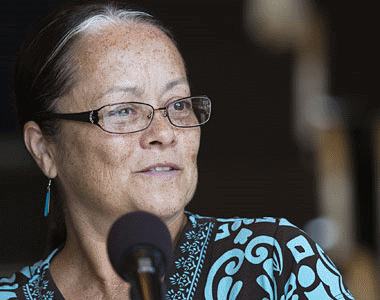Gwen Westerman and Glenn Wasicuna Speak at EHS
January 17, 2014
This Friday, Edina High School’s tenth grade English classes had the opportunity to hear lectures by two distinguished Dakota people, who came as speakers as part of Pre-AP English’s unit on colonization. Dr. Gwen Westerman, the first speaker, is currently an English professor at Minnesota State University and recently published a book on the indigenous people in our state entitled “Mni Sota Makoce: Land of the Dakota.” The second speaker, Glenn Wasicuna, is one of a small number of remaining native speakers of the Dakota language still alive.
Both speakers opened by speaking in the Dakota language. Dr. Westerman greeted the listeners as family. Her speech was mostly centered around her work in the Minnesota Historical Society looking through old documents and letters, trying to uncover historical aspects of the life of the indigenous people of Minnesota. Her speech hit on notes of selective interpretation of history, and she questioned why most Minnesotans know the story of Paul Bunyan but not the stories of the Dakota people native to this area.

Wasicuna’s speech was more of a story than a lecture, and he told the audience about various parts of his life. As a young child he was sent to boarding school which he said was meant to take the Dakota cultural aspects out of him. Unlike other reports by Native Americans sent to boarding school, he didn’t complain about the conditions of the school but rather about the intent of the school to separate him from his family and heritage.
After the presentation both speakers stayed to talk to students interested in what they said. “It’s really nice that the young people are interested because I want them to go home and talk to their parents, to their relatives, to their neighbors and tell them what they’ve learned,” said Wasicuna.
“I hope that students take away the fact that Dakota people are alive. We live here now and we aren’t part of the past… we’re also part of the present,” said Dr. Westerman.
EHS sophomore Kamron McDaris said that he found the presentation valuable “because [we’re] getting firsthand stories from people who are experiencing what we’re learning about.”
“I got a different perspective on boarding schools,” added sophomore Rachel Morris.
Les Roseveare • Jan 17, 2016 at 3:02 pm
I am 62 years old and grew up near Kenton Manitoba. When I was in about grade 4 at Kenton, a program started when a group of students from a reserve 10 miles away (Sioux Valley) began attending our school. Some of them I fought with, some I got along with and all I got to know. At the time, we were told that the Sioux Valley students had gone to school somewhere else but that arrangement had ended and they didn’t have a school on the reserve. So the student body was split in half with half coming to Kenton and the other half going to another near by town, Oak Lake. This program lasted about ten years. I realized years later that, before coming to my school, these students had no doubt come from a residential school, a black mark in Canadian history that upsets me to this day. However, I did get to know one aboriginal student quite well and we were good friends. I enjoyed classes with him for about four years. After grade 8, he went to school somewhere else and I lost touch. He was very well mannered, polite and smart. He liked hockey and loved motorcycles so we had lots to talk about. Over the years many times I have thought of him and wondered what became of him. His name was Glenn Wasicuna and today I entered that name on Google. I seen the site we are on now and the picture of Glenn. Although it has been almost 50 years since I last seen Glenn, I am 99% sure the picture above is him. I am asking anyone who reads this to please forward this comment, along with my e-mail address [email protected], to Glenn and hopefully he contacts me.
Thank you
Les Roseveare
Saskatoon, Saskatchewan
Canada